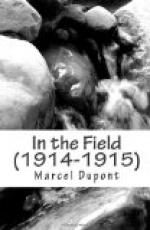Our anxiety did not last long. We soon made out our Chasseurs, coming back quietly, not running, and in good order. They took to the ditch, a fairly deep one, which ran along on the left side of the road, and covered them up to the middle. The German shells were badly aimed, and exploded either in front of them or higher up on the hillside. But our anxiety became more intense every minute. Had a shell fallen on the road or in the ditch, we should have seen those brave fellows knocked over, mown down, cut to pieces, by the hail of bullets. When we are fighting ourselves we hardly have time to think about our neighbours in this way. We have our own cares, and our first thought is the safety of the men who form our little family, the troop. But when one is safe, or fairly so, it is torture to watch comrades advancing under the enemy’s fire without any protection. At that moment the Germans were concentrating their fire upon that small line of men we were looking at, 200 yards away from us. The shells succeeded one another uninterruptedly, but without any greater precision. We watched our friends coming nearer until they had almost reached our barricade, and noticed that two of the Chasseurs were being supported by their comrades. In our anxiety, we got up out of shelter, but d’A. shouted: “It’s nothing; only scratches....”
At last they got in, and whilst our good and indefatigable Assistant-Surgeon P. took charge of the wounded men we pressed round the officer and questioned him as to what he had seen. “Are there many of them?” “Was there any infantry?” we asked. But his daring reconnaissance had not been very fruitful. He had had to stop when the artillery had opened fire on him, and had not been able to see how many adversaries we had to deal with.
Acting on the advice of Major P., our Captain, who had just rejoined us with the third troop, gave orders to mount. We were only in the way here, where there were too many defenders already, so recrossed the bridge to put ourselves at the Colonel’s disposal. I led with my troop, and we passed through Jaulgonne by the main street. The inhabitants thought we were beating a retreat and became uneasy. Some women uttered cries, begging us not to leave them at the mercy of the enemy. We had to calm them by saying that they need not fear, that we were still holding the Germans, that our infantry would soon arrive, and that in an hour the foe would have decamped.
To tell the truth, we were not quite so sure of it ourselves. The enemy was in some force, and he had guns. Our infantry had at least 15 kilometres to march before their advance guard even could debouch on the bridge at Jaulgonne. If they had not started before dawn they would not arrive before eleven o’clock, and it was then barely nine. The German artillery was already beginning to fire upon the village.




